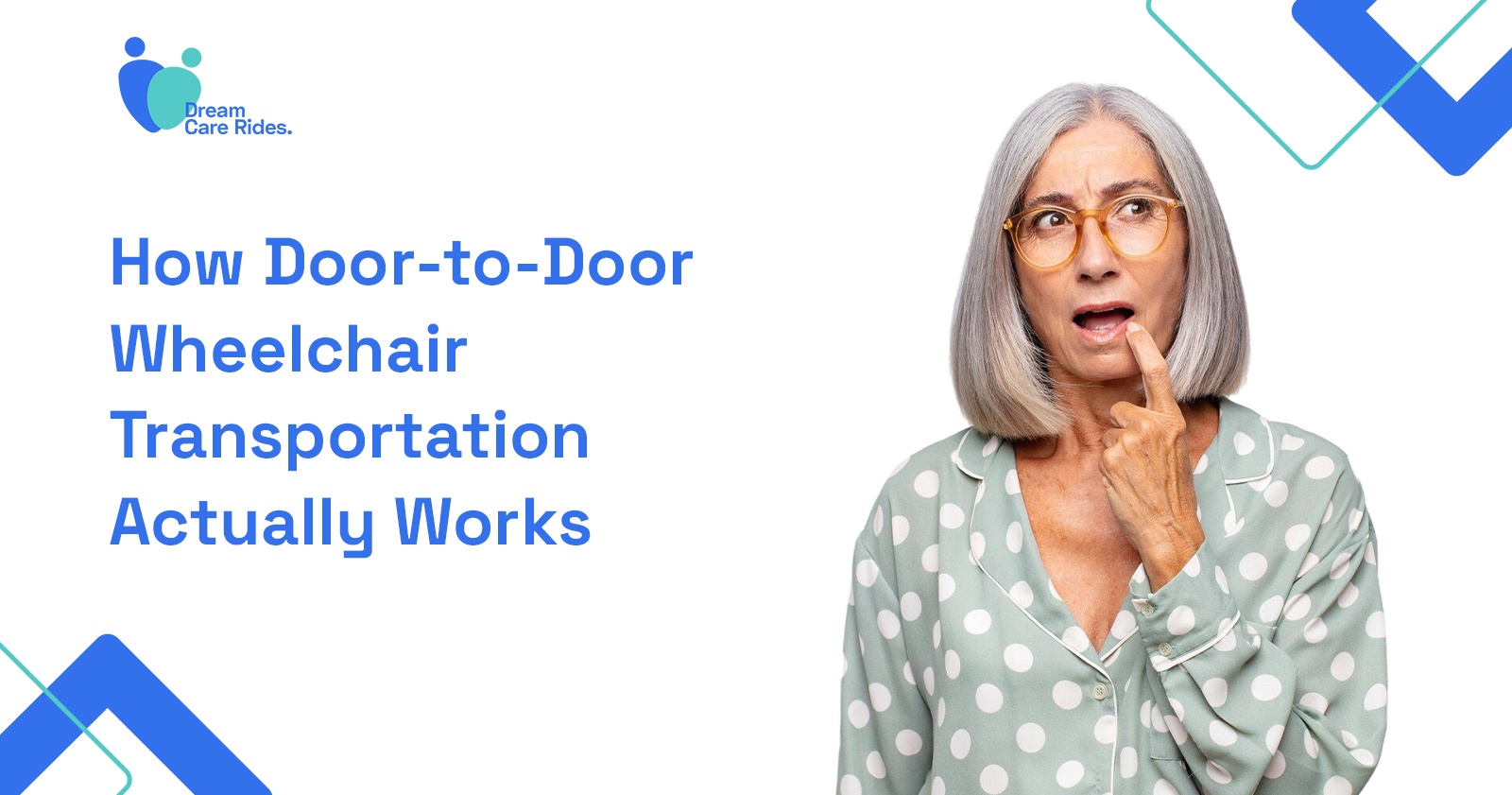How Reliable Transportation Can Enhance Patient Experiences in Hospital Care
Reliable transportation is fundamental to patient experience and access to healthcare....
Created by: Daniel Ogunsemowo /
Vetted by:
Otse Amorighoye

The Role of Transportation in Healthcare
Imagine being in need of medical care but struggling to get to the hospital because of unreliable transportation. For many patients, especially the elderly, disabled, or low-income individuals, this scenario is a harsh reality. In a study by the National Academies of Sciences, Engineering, and Medicine, transportation barriers were shown to result in missed appointments, delayed treatments, and increased healthcare costs. This barrier affects over 3.6 million people in the U.S. every year. Without reliable, accessible transportation, patients often struggle to access the care they need when they need it.
For hospitals and healthcare providers, ensuring reliable transportation for patients can dramatically improve their experience and outcomes. When patients have access to consistent, comfortable transportation, they’re more likely to attend their appointments, follow through with treatments, and experience less stress related to hospital visits. Reliable transportation is a critical piece of healthcare that can improve patient satisfaction, adherence to care, and overall quality of life.
In this article, we will explore the importance of reliable transportation in hospital care, how it affects patient experiences, and what healthcare providers can do to ensure patients have access to it.
The Importance of Transportation in Healthcare
Why Transportation Matters for Patient Health
Transportation is more than a means of getting from one place to another—it's an essential component of healthcare access. Missed appointments due to lack of transportation lead to worsened health outcomes and increased hospital readmission rates. Reliable transportation reduces these issues and supports continuous care, helping patients avoid emergency visits and fostering preventive care practices.
Impact of Transportation on Patient Adherence
Studies show that patients who have reliable transportation are 2.6 times more likely to follow through with their treatments. This adherence leads to better health outcomes and minimizes the risk of chronic disease complications. Patients with consistent transportation options are also more likely to feel a sense of trust in their healthcare providers, as they experience fewer barriers to accessing care.
Role of Transportation in Reducing Stress and Anxiety
Transportation to and from medical appointments significantly impacts a patient’s stress levels, especially for those undergoing treatments like dialysis, chemotherapy, or physical rehabilitation. Reliable, safe, and comfortable transportation allows patients to focus on their health and healing rather than worrying about how they will get to the hospital.
Reducing Healthcare Costs
A lack of reliable transportation often leads to missed appointments, which cost the healthcare industry billions of dollars annually. Additionally, emergency services are frequently used as alternatives for missed preventive care appointments, increasing overall healthcare spending. By prioritizing transportation for non-emergency medical appointments, healthcare providers can reduce costs associated with readmissions and emergency care usage.
Types of Reliable Transportation Solutions for Patients
Non-Emergency Medical Transportation (NEMT)
Non-Emergency Medical Transportation (NEMT) is designed to assist patients who do not require an ambulance but still need assistance reaching healthcare facilities. NEMT services are typically offered through specialized companies that cater to individuals with mobility challenges, disabilities, or lack of access to other transportation options. These services help reduce missed appointments and improve healthcare access, especially for rural or underserved communities.
Ride-Sharing and Partnerships with Transportation Companies
Healthcare facilities are increasingly partnering with ride-sharing companies to provide flexible transportation options for patients. Partnerships with companies like Lyft or Uber have expanded patient access to care, particularly in urban areas, where public transportation may not always be accessible or convenient. These partnerships provide affordable and reliable alternatives to traditional forms of transportation.
Shuttle Services for Hospitals and Clinics
Many hospitals and clinics offer free or low-cost shuttle services for patients, connecting nearby communities with healthcare facilities. These shuttles are especially beneficial for elderly or disabled patients who cannot drive and for those who rely on public transportation.
Wheelchair-Accessible Transportation
Wheelchair-accessible transportation services are essential for individuals with mobility impairments. These vehicles are designed to comfortably accommodate wheelchairs and other mobility aids, making it easier for patients to attend appointments without having to rely on assistance from family or friends.
Benefits of Reliable Transportation in Enhancing Patient Experiences
Improved Patient Satisfaction
When patients have access to dependable transportation, they are more likely to attend appointments, follow up on treatments, and experience a sense of control over their healthcare journey. Studies suggest that patient satisfaction scores increase by up to 35% when transportation is not a barrier to care.
Increased Treatment Adherence
Reliable transportation enables patients to attend regular follow-ups, which is critical for managing chronic conditions. According to the American Hospital Association, patients who have dependable transportation options are 40% more likely to adhere to their treatment schedules. This adherence fosters better long-term health outcomes.
Reduced Hospital Readmissions
Patients who miss appointments due to lack of transportation are at higher risk for readmissions, especially if they have chronic health issues. Reliable transportation ensures these patients receive the preventive and follow-up care needed to avoid unnecessary hospital stays. A recent study by the Journal of the American Medical Association found that access to transportation reduced readmission rates by 15%.
Key Considerations for Hospitals in Providing Transportation Services
Establishing Partnerships with Transportation Providers
Hospitals can work with local and national transportation providers to create reliable options for patients. This can include discounts, shuttle programs, and dedicated services for patients who lack other means of transportation.
Incorporating Telehealth as an Alternative
While transportation is critical for in-person visits, telehealth offers a viable alternative for certain appointments, especially follow-ups and consultations. Telehealth reduces the need for patients to travel, saving time and resources while ensuring they stay engaged with their care plan.
Education and Awareness
Many patients are unaware of transportation options available to them. Healthcare providers can improve awareness by informing patients about NEMT, shuttle services, and telehealth during consultations. This proactive communication can help patients plan for their transportation needs and prevent missed appointments.
Improving Patient Access to Reliable Transportation
Ensuring reliable transportation is accessible to every patient is not only a healthcare imperative but a community responsibility. Whether through partnerships with transportation services, development of shuttle programs, or awareness campaigns, hospitals can make a significant impact on patient health outcomes. If you or a loved one needs assistance reaching medical appointments, speak with your healthcare provider about transportation options and discover resources that can help make hospital visits easier and more comfortable.
Frequently Asked Questions
1. What is Non-Emergency Medical Transportation (NEMT)?
Answer: NEMT refers to services that provide transportation to patients who do not need emergency care but still require assistance reaching medical appointments. These services are designed to help people with mobility challenges or limited transportation options.
2. How do I find transportation services for my hospital visits?
Answer: Start by asking your healthcare provider or hospital about transportation options. Many hospitals partner with transportation services or offer shuttle services. Additionally, ride-sharing apps often partner with healthcare providers to offer discounted rides.
3. What should I do if I miss an appointment because of transportation issues?
Answer: Contact your healthcare provider as soon as possible to reschedule. Explain the transportation barrier and inquire about alternative options such as telehealth or shuttle services.
4. Are transportation services covered by insurance?
Answer: Some insurance plans, including Medicaid, may cover NEMT services. However, coverage varies, so it’s best to check with your insurance provider to understand what transportation options may be available to you.
5. How can reliable transportation improve my healthcare experience?
Answer: Reliable transportation can reduce stress related to reaching appointments, increase your likelihood of following through with treatments, and enhance your overall satisfaction with healthcare services. It plays a key role in ensuring you receive timely and consistent care.
Conclusion
Reliable transportation is fundamental to patient experience and access to healthcare. By removing the barriers associated with transportation, hospitals and healthcare providers can create a supportive environment that promotes health and well-being. Whether through NEMT, telehealth, or partnerships with transportation services, addressing the transportation needs of patients is a powerful way to improve healthcare delivery, patient satisfaction, and community health outcomes.
Related Articles





